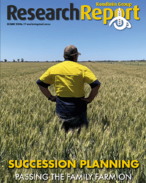This article is 7 years old. Images might not display.
Commodities such as sugarcane, dairy and fertiliser however look to be heading toward positive territory for the first time this year.
The second driest July on record has taken its toll on seeding success in Western Australia, South Australia and parts of Victoria with a 27 per cent year-on-year decrease in Rabobank’s 2017/18 wheat harvest forecast. The rural bank’s forecast for the upcoming canola harvest currently stands at 3.17 million tonnes, down 23% year-on-year.
A reduced supply outlook due to low rainfall forecasts are expected to have a positive effect on canola with prices moving to $520/t, however wheat prices fell 15% due to a global glut of grain. A potentially poor season both here and overseas may see wheat prices recover according to the Agribusiness monthly report.
Rabobank said now many farmers will be looking for a wet spring to minimise the expected fall in production for this season.
The outlook for wool will prove interesting according to the agribusiness specialists as the strong Aussie dollar will create a challenge between the strong demand for Merino wool in China and Italy and prices at auction.
Sheepmeat is also expected to decline due to exchange rates and the end of the July natural decline in demand for lamb both domestically and globally.
“The month of July generaly marks the high point in the season for trade and export lambs with process easing through the third quarter as the spring supply comes on to the market,” it was stated in the report.
Dairy is expected to see a 2.5% increase in production in 2017/18 due to better farmgate milk prices, affordable trading conditions and a better supply of feed supporting a partial recovery in the sector. According to Rabobank, an expected weaker Aussie dollar may not be an issue for dairy farmers as exporters are currently entering a key selling season. Global butter prices have again risen as a butter shortage continues.
The infant formula juggernaut has slowed significantly however due to new product registration laws in China effecting trade to the country, currently only five international companies have been approved to sell infant formulas.
Cattle prices are predicted to ease and live export numbers continue a downward trajectory year-on-year, down 47% with volumes to Indonesia down 34%. However prices are expected to remain high, above $3/kg lwt.
To read the report click HERE.






















